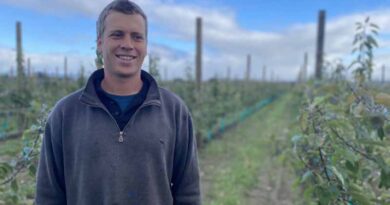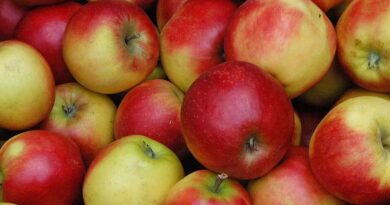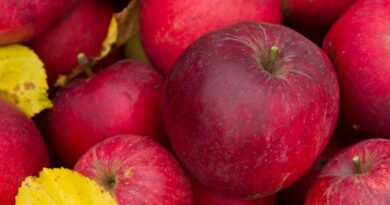A burgeoning apple industry in Canterbury
23 November 2023, NZ: Canterbury’s tiny apple industry is undergoing massive change, with pastoral and arable farmers adding apples into their mix and plans for new post-harvest facilities taking shape.
Rockit is already making its mark as one of the region’s potential major players, joining forces with Turley Farms which owns a substantial operation involving stock, arable, vegetables and now pipfruit on different blocks that total about 3000ha.
Last winter, the joint venture planted 20ha of the snack-sized apple at Rangitata and Rockit’s commercial general manager, Tom Lane, says that will expand considerably. Rockit and Turley Farms are now seeking a third partner to join them in developing a further 80ha on the block by 2025. The company is also working with other farmers and growers in Canterbury with a goal of having up to 600ha eventually planted in Rockit throughout the region.
“We are very focused on how we can increase and future-proof our supply footprint in New Zealand,” he says.
Modelling different climate scenarios in different regions identified Canterbury as a strong contender for expansion, he says, with its abundance of land and water, the likelihood it will benefit from climate change, and even the separation by the Cook Strait providing additional biosecurity protection. Plus, apples are a perennial crop that require less water and nutrient inputs than the dairy and cropping that cover much of the Canterbury Plains.
Rockit has been trialling its apples on different blocks in Canterbury, including Turley Farms, before cranking up planting.
“Turleys have a well-deserved reputation for successful innovation and diversification and are closely watched by other growers in the region.”
Over the past few years, Turley Farms has established a trial orchard with different varieties under the supervision of their own in-house agronomist. Tom says the expertise and insight they had already gathered before approaching Rockit gave the company confidence Turley Farms was the right partner to pioneer the variety in the South Island.
Tom says Rockit is also working with other apple varieties and landowners to plan and develop post-harvest facilities near Rolleston. A location has already been selected that has access to road, rail, shipping and a large labour pool.
He says banks were initially cautious about apple development projects in the region, in part because their expertise lay in dairy and arable operations. But in the past couple of years there has been increased focus on diversification opportunities, including apples.
Rockit’s high value has helped attract growers and investment, Tom says. Recent New Zealand Trade and Enterprise figures for New Zealand apple sales into China showed Rockit selling for US$7.79/kg compared with average New Zealand apple prices of US$2.41/kg.
Until this year, there have been just 13 apple growers in Canterbury on 16 orchards, according to figures from NZ Apples & Pears. In all, it has added up to 186ha or two percent of the national crop.
Back in the 1990s, Canterbury had the country’s largest corporate orchardist, Apple Fields, which had 720ha on the outskirts of Christchurch and had the capacity to produce 1.5 million cases of apples a year. But when it clashed with the Apple and Pear Marketing Board’s single-desk-marketing strategy, it ended up in long, expensive court battles.
Although it eventually won, Apple Fields later went on to quit the industry and concentrate on property development, and today houses have replaced the orchards.
Near Timaru, M A Orchards has been growing apples since 2012 and is now a joint venture between Milford Private Equity and Bostock New Zealand with about 100ha of organic Honeycrisp. The variety requires a colder temperature to develop flavour and texture and with just one variety, M A Orchards’ apple harvest is done and dusted in three-and-a-half weeks.
Technical manager Carla Clelland says apples have been a small industry in Canterbury, but now blocks of apple trees are popping up on other properties as landowners add more diversification into their mix.
“I think it has got potential for some quite massive growth. There’s plenty of land – hectares and hectares of flat, fertile land.”
She says one of the reasons for adding apples into the mix is the low environmental impact of an apple crop at a time environmental regulations are tightening. Another reason is the ability to create a small, intensive operation for a family member within a family farming business. Canterbury also offers geographical diversification for businesses seeking a way to manage climatic risk, she says.
“If the production of a variety or brand is badly impacted by climate or other factors in one growing region, having a supply base with geographical spread means that there is likely to be some fruit available to supply customer programmes.
The region’s lower rainfall means it is also ideal for growing organic apples, she says. But it is cooler and the challenge will be finding varieties that are a good match for the climate. Honeycrisp works and so does Rockit because the Canterbury climate naturally grows smaller fruit.
Carla says one of the stumbling blocks to growth has been the need for post-harvest facilities. The bulk of the region’s apples head by road to Nelson where they are packed and shipped out of the port. Some fruit is held in coolstores in Canterbury though, before it heads to Nelson.
Honeycrisp has different cool storage which requires more challenging coolstore logistics, and growers send the fruit to Nelson when there is a packing slot available. Carla says the region “really needs a packhouse down here”, with multiple port options at Timaru, Lyttelton and Port Chalmers to export its fruit.
NZ Apples & Pears chief executive Karen Morrish agrees, saying further investment in post-harvest facilities will be required in Canterbury to support the industry’s growth, including both packhouses and coolstores, which it is keen to support.
She describes Canterbury as an emerging area for the apple and pear industry and is excited about its potential. Its climate offers different growing conditions that suit particular varieties of fruit, and also offers access to water.
“Pipfruit is certainly an option for farmers in the pastoral sector looking to diversify and replace growth forsaken due to environmental constraints.”
Prior to Cyclone Gabrielle, apples and pears was a $900 million industry with a projection of reaching the $2 billion mark in a decade, and Karen says increased planting in places like Canterbury will support that growth.
“Regardless of Cyclone Gabrielle, diversification and growth in Canterbury and in other areas around the country is something we are pleased to see and keen to support.”
Also Read: Global Fisheries Conference 2023 to be organized in India on 21-22 November at Ahmedabad
(For Latest Agriculture News & Updates, follow Krishak Jagat on Google News)














